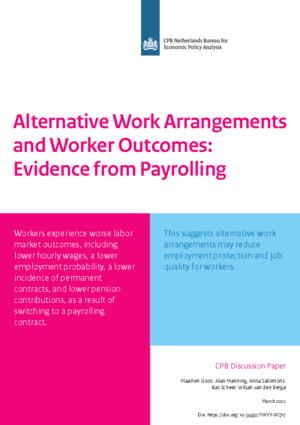March 30, 2022
DOI: 10.34932/YWVY-WQ17
Alternative Work Arrangements and Worker Outcomes: Evidence from Payrolling
The rising incidence of alternative work arrangements raises questions about worker outcomes in non-standard labor contracts. However, causal evidence on the effects of flexible contracts on labor market outcomes of individual workers is scarce. We study this question using data on payrolling, a work arrangement where employees are on the payroll of one company while performing their job duties at another firm. Like employment agencies, payroll companies can offer flexible employment contracts. Payrolling is a growing phenomenon on the Dutch labor market, and is particularly prevalent in low-wage jobs in the service sector.
We show that employees who receive a payrolling contract subsequently have a reduced chance of employment, a lower incidence of permanent contracts, lower pension contributions, and lower growth in hourly wages. Some of this effect disappears in the three years after payrolling as employees switch jobs.
These findings are based on payrolling prior to the 2020 enactment of new labor law in the Netherlands (Wet Arbeidsmarkt in Balans WAB). This law equates the legal protection of employees on payrolling contracts to that of standard contracts, including pension accrual. Future research could consider whether adverse effects for individual employees have indeed been remedied since the introduction of this law.
Downloads
.
Authors


Maarten Goos
Alan Manning
Anna Salomons
